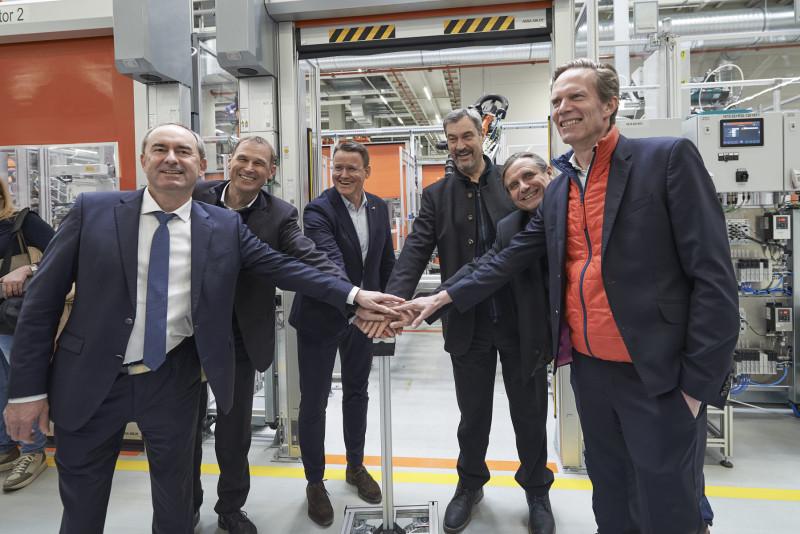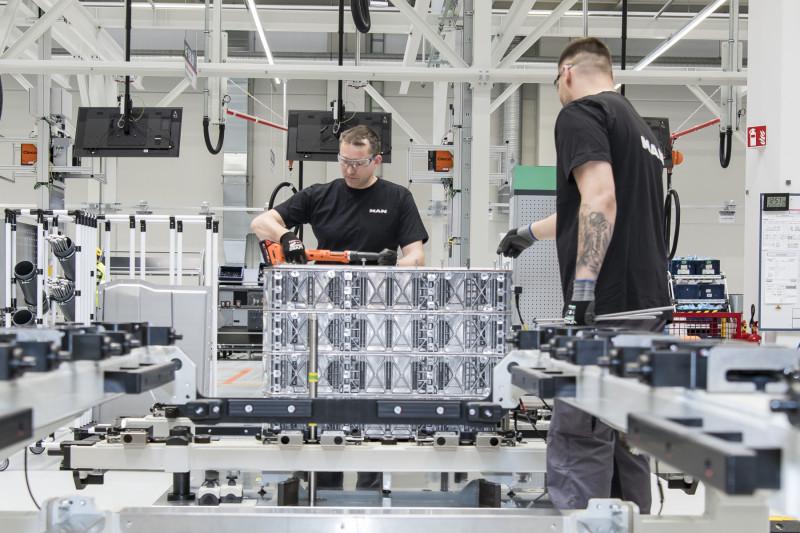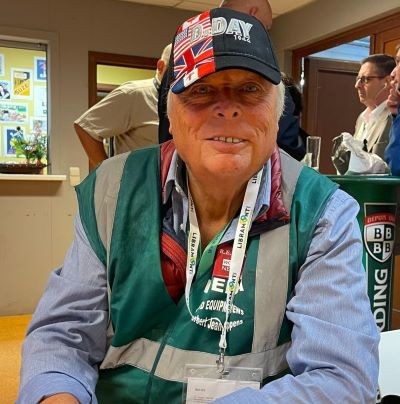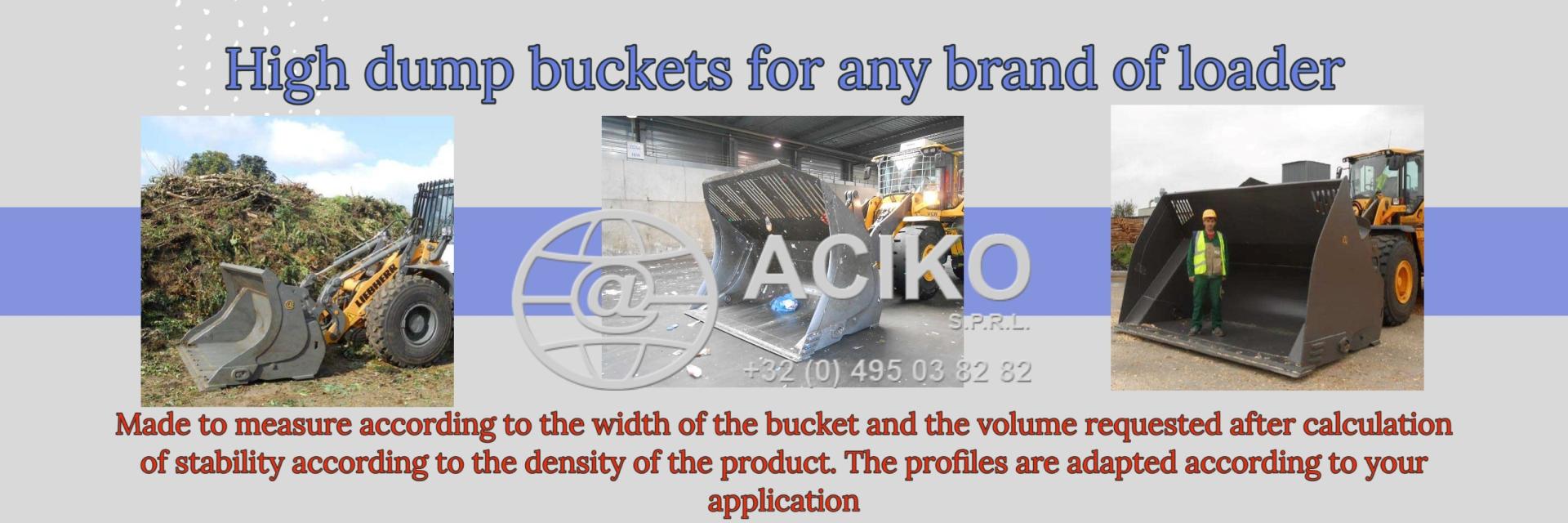MAN invests half a billion euros in Nuremberg
 15/04/25-FR-English-NL-footer
15/04/25-FR-English-NL-footer
MAN investit un demi-milliard d'euros à Nuremberg

 Image-At the start of battery series production at the Nuremberg site: Minister of State Hubert Aiwanger, Michael Kobriger, MAN Executive Board Member for Production and Logistics, MAN CEO Alexander Vlaskamp, Bavarian Minister President Dr. Markus Söder, Markus Wansch, Chairman of the Works Council at the Nuremberg site and Dr. Frederik Zohm, MAN Executive Board Member for Research and Development.
Image-At the start of battery series production at the Nuremberg site: Minister of State Hubert Aiwanger, Michael Kobriger, MAN Executive Board Member for Production and Logistics, MAN CEO Alexander Vlaskamp, Bavarian Minister President Dr. Markus Söder, Markus Wansch, Chairman of the Works Council at the Nuremberg site and Dr. Frederik Zohm, MAN Executive Board Member for Research and Development.
L'investissement dans la production à grande échelle de batteries MAN passe de 100 à environ 250 millions d'euros – la valeur ajoutée est renforcée.
Avec l'investissement dans la production de moteurs diesel, près d'un demi-milliard d'euros seront investis sur le site de Nuremberg.
Lancement officiel de la production de batteries en présence du ministre-président bavarois, Markus Söder.
MAN garantit environ 400 emplois durables sur le site de Nuremberg dans le secteur des batteries.
MAN Truck & Bus a officiellement inauguré aujourd'hui sa production de batteries sur le site de Nuremberg, en présence du ministre-président bavarois, Markus Söder, et du ministre d'État, Hubert Aiwanger. Lors de cet événement, le constructeur munichois de véhicules utilitaires a annoncé pour la première fois la prochaine étape d'expansion de sa production de batteries à Nuremberg. Outre les quelque 100 millions d'euros déjà investis dans l'usine de production, 150 millions d'euros supplémentaires seront investis dans les années à venir pour développer l'expertise dans le domaine des batteries et accroître la valeur ajoutée. Concrètement, cela signifie, entre autres, qu'en plus des packs composés de plusieurs modules, les modules eux-mêmes, qui combinent plusieurs cellules de batterie, seront également produits à Nuremberg pour la prochaine génération de batteries.
Sur les investissements supplémentaires annoncés, d'un montant total d'environ 150 millions d'euros, environ 18 millions d'euros seront subventionnés. Le ministère fédéral de l'Économie et de la Protection du climat (BMWK) et l'État libre de Bavière financent conjointement ce financement. De plus, l'État libre de Bavière finance le développement et la recherche sur la technologie des batteries sur le site MAN de Nuremberg à hauteur d'environ 30 millions d'euros. Ces fonds seront utilisés pour la recherche dans des domaines tels que l'assemblage des batteries, la chimie et le vieillissement des cellules, ainsi que la sécurité des batteries. Au total, les investissements à Nuremberg permettront de sécuriser environ 400 emplois dans une technologie d'avenir et de poursuivre la transformation du site. Les employés travaillant dans la production de batteries, auparavant employés dans les secteurs de l'assemblage de moteurs, de la fonderie ou de la logistique, ont pu se lancer dans un nouveau secteur d'activité porteur d'avenir grâce à une reconversion.
« Aujourd'hui est un jour historique pour MAN. » Avec le lancement de la production de batteries, l'entreprise inventrice du moteur diesel entre dans une nouvelle ère. Nous sommes très fiers de ce que nous avons créé ici à Nuremberg et de ce qui continuera de se développer. Aujourd'hui, nous avons annoncé une nouvelle étape dans la transformation vers des motorisations respectueuses de l'environnement : MAN investira 150 millions d'euros supplémentaires dans l'expansion de la production de batteries pour les futures générations à Nuremberg. Nous avons également récemment intensifié nos efforts dans le développement de technologies diesel de pointe. Cela porte l'investissement total à Nuremberg à un demi-milliard d'euros. « C'est un engagement clair envers la Bavière et l'Allemagne en tant que pôle d'innovation », déclare Alexander Vlaskamp, PDG de MAN. Le Ministre-Président Dr Markus Söder a souligné :
« L'électromobilité made in Bavaria : c'est une étape importante pour MAN et la Bavière en tant que site industriel ! Grâce à une politique de site de pointe et à une excellente coopération entre la direction, le comité d'entreprise, les employés et les responsables politiques, MAN a réussi à transformer son ancien site de moteurs diesel pur en un site de production de batteries ultramoderne pour camions électriques. Cela renforce le site, sécurise et crée des emplois et renforce la compétitivité internationale. La Bavière est et restera un Land automobile, y compris dans le secteur des véhicules utilitaires. Après un financement initial de 30 millions d'euros en 2022 pour la recherche et le développement, l'État libre soutient la future production de modules de batteries à hauteur de près de six millions d'euros. »
Le démarrage de la production de batteries marque déjà l'ouverture de la deuxième nouvelle ligne de production à Nuremberg cette année. La production de la dernière génération de moteurs diesel MAN, utilisés dans la nouvelle transmission D30 PowerLion, constitue également un investissement pour l'avenir et garantit de nombreux emplois sur le site. MAN a investi environ 250 millions d'euros dans ce projet. MAN estime actuellement que près de la moitié des camions en Europe et environ 90 % des bus urbains seront livrés avec des systèmes de propulsion zéro émission d'ici 2030. Le moteur D30, très efficace et économe en carburant, sera donc encore nécessaire jusque dans les années 2030. D'autres plateformes et séries de moteurs seront également disponibles à long terme dans le secteur des moteurs externes de MAN.
Sur le site MAN de Nuremberg, les packs de batteries sont fabriqués selon trois formats. Un format plat équipe le MAN Lion's City E, l'autobus urbain électrique à batterie. Deux autres formats équipent les camions électriques MAN eTGL, MAN eTGS et MAN eTGX, d'un poids total compris entre 12 et 50 tonnes. Le démarrage de la production en série des camions électriques MAN eTGS et eTGX à Munich est prévu pour juin prochain.
Dans le cadre de la phase d'expansion actuelle, 50 000 packs de batteries peuvent être produits par an à Nuremberg. Le nouveau bâtiment M50 est conçu pour produire 100 000 unités par an. La production de batteries sera augmentée en fonction de la demande de véhicules électriques à batterie.
MAN utilise la chimie des cellules NMC (nickel-manganèse-cobalt) pour ses batteries, spécialement adaptée au fonctionnement des véhicules utilitaires. Le système de gestion de batterie (BMS) surveille en permanence l'état des cellules pendant le fonctionnement. En cas d'imprévu, par exemple, il prend des mesures internes pour garantir un état de charge sûr. En cas d'accident, le BMS déconnecte immédiatement la batterie du reste du véhicule (arrêt d'urgence haute tension). Il utilise également un système intelligent de chauffage et de refroidissement pour maintenir les cellules de la batterie à une température optimale en permanence.
La production modulaire est un atout technologique majeur dans la production à grande échelle de packs de batteries qui débute. MAN utilise ainsi un système sans convoyeur ni cycle, capable de gérer différentes variantes de produits et s'adaptant facilement à de nouvelles variantes. Les stations découplées peuvent être exploitées et converties indépendamment les unes des autres, et les packs de batteries circulent dans le système de production en fonction des besoins et de l'état de chaque produit. Ceci est rendu possible par un haut degré de numérisation et d'automatisation du flux de production et de l'approvisionnement en matériaux, entièrement automatisé grâce à des véhicules à guidage automatique (AGV) connectés en réseau intelligent. Cela garantit la flexibilité et la polyvalence nécessaires, ainsi qu'une production économique de différents packs de batteries.
La qualité et la sécurité ont toujours été des priorités absolues dans la production MAN. Cela s'applique également à la production de nouvelles batteries. Chaque pack de batteries est soumis à un test de fin de ligne. L'accent est mis sur divers tests logiciels, des tests électriques tels que la charge/décharge, la vérification des données des cellules et modules de batterie transmises par le fournisseur, ainsi qu'un test d'étanchéité. En effet, les unités de stockage d'énergie compactes doivent résister au vent, aux intempéries et à un jet de vapeur. À cette fin, chaque batterie est soumise à 23 programmes de test et environ 400 paramètres de test sont enregistrés. Ces données sont documentées individuellement pour chaque batterie. Cela signifie que le processus de production reste traçable même après 15 ans.
NJC.© Info MAN Trucks
-----------------------------------------------------------------------------------------------------------------
 15/04/25-English
15/04/25-English
MAN invests half a billion euros in Nuremberg

 Image-At the start of battery series production at the Nuremberg site: Minister of State Hubert Aiwanger, Michael Kobriger, MAN Executive Board Member for Production and Logistics, MAN CEO Alexander Vlaskamp, Bavarian Minister President Dr. Markus Söder, Markus Wansch, Chairman of the Works Council at the Nuremberg site and Dr. Frederik Zohm, MAN Executive Board Member for Research and Development.
Image-At the start of battery series production at the Nuremberg site: Minister of State Hubert Aiwanger, Michael Kobriger, MAN Executive Board Member for Production and Logistics, MAN CEO Alexander Vlaskamp, Bavarian Minister President Dr. Markus Söder, Markus Wansch, Chairman of the Works Council at the Nuremberg site and Dr. Frederik Zohm, MAN Executive Board Member for Research and Development.
Investment in large-scale production of MAN batteries increases from 100 to around 250 million euros – added value is deepened
Together with investment in diesel engine production, almost half a billion euros for the Nuremberg site
Official start of battery production in the presence of Bavarian Prime Minister Dr Markus Söder
MAN secures a total of around 400 sustainable jobs at the Nuremberg site in the battery sector
MAN Truck & Bus officially launched its battery production at the Nuremberg production site today in the presence of Bavarian Minister President Dr Markus Söder and State Minister Hubert Aiwanger. During the event, the Munich-based commercial vehicle manufacturer announced the next expansion stage of its battery production in Nuremberg for the first time. In addition to the approximately 100 million euros already invested in the production facility that has now been launched, a further 150 million euros will be invested in the coming years to further develop expertise in the field of battery technology and increase the depth of added value. In concrete terms, this means, among other things, that in addition to the packs, which consist of several modules, the modules themselves, which combine several battery cells, will also be produced in Nuremberg for the next battery generation.
Of the announced additional investments totalling around 150 million euros, around 18 million euros will be subsidised. Both the Federal Ministry of Economics and Climate Protection (BMWK) and the Free State of Bavaria are providing the funding. In addition, the Free State of Bavaria is funding the further development of and research into battery technology at the MAN site in Nuremberg with around 30 million euros. These funds will be used for research in areas such as battery assembly, cell chemistry and ageing as well as battery safety. Overall, the investments in Nuremberg will secure around 400 jobs in a technology of the future and further advance the transformation of the site. The employees working in battery production were previously employed in the areas of engine assembly, foundry or logistics and were able to open up a new, future-proof field of work for themselves thanks to retraining.
‘Today is a historic day for MAN. With the start of battery production, the company that invented the diesel engine is entering a new era. We are very proud of what we have created here in Nuremberg and what will continue to be created. Today we announced another milestone in the transformation towards climate-friendly drives: MAN will invest a further 150 million euros in the expansion of battery production for future battery generations in Nuremberg. We have also recently stepped up our efforts in the further development of state-of-the-art diesel technology. This brings the total investment in Nuremberg to half a billion euros. This is a clear commitment to Bavaria and Germany as a centre of innovation,’ says MAN CEO Alexander Vlaskamp.
Minister President Dr. Markus Söder emphasized:
“Electromobility made in Bavaria: this is a milestone for MAN and Bavaria as an industrial location! With a state-of-the-art site policy and great cooperation between management, works council, employees and politicians, MAN has successfully transformed itself from a former site for pure diesel engines into a state-of-the-art battery production site for electric trucks. This strengthens the location, secures and creates jobs and international competitiveness. Bavaria is and will remain an automotive state - also in the commercial vehicle sector. Following initial funding of 30 million euros in 2022 for research and development, the Free State is supporting the future production of battery modules with almost six million euros.”
The start of battery production is already the second new production line to be opened in Nuremberg this year. The production of the latest generation of MAN diesel engines, which are used in the new D30 PowerLion driveline, is also an investment in the future and secures many jobs at the site. MAN has invested around 250 million euros in this project. MAN currently assumes that almost half of the trucks in Europe and around 90 per cent of city buses will be delivered with zero-emission drive systems by 2030. The highly efficient, fuel-efficient D30 engine will therefore still be needed well into the 2030s. Other engine platforms and series will also be available in MAN's external engine business in the long term.
At the MAN site in Nuremberg, battery packs are manufactured in three so-called form factors. A flat form factor is used in the MAN Lion's City E, the battery-electric city bus. Two other form factors are used in the MAN eTGL, MAN eTGS and MAN eTGX eTrucks with total weights of 12 to 50 tonnes. The start of series production of the MAN eTrucks eTGS and eTGX in Munich is planned for June this year.
In the current expansion stage, 50,000 battery packs can be produced per year in Nuremberg. However, the new M50 building is designed to be able to produce 100,000 units per year. Battery production will be scaled up depending on the demand for battery-electric vehicles.
MAN uses NMC cell chemistry (‘nickel-manganese-cobalt’) in its batteries, which has been specially adapted to the operation of commercial vehicles. The battery management system (BMS) continuously monitors the condition of the cells during operation. If, for example, an unforeseen event occurs, it takes internal measures to ensure a safe state of charge. In the event of an accident, the BMS immediately disconnects the battery from the rest of the vehicle (high-voltage emergency shutdown). It also uses an intelligent heating and cooling system to keep the battery cells in an optimum temperature range at all times.
Modular production is a technological highlight in the large-scale production of battery packs that is now starting. This means that MAN works with a system without a conveyor belt and cycle that can handle different product variants and can be easily adapted to new variants. The decoupled stations can be operated and converted independently of each other, and the battery packs flow through the production system depending on individual requirements and condition. This is made possible by a high degree of digitalisation and automation in the production flow and material provision, which is fully automated with intelligently networked automated guided vehicles (AGVs). This ensures the necessary flexibility and versatility as well as the economical production of different battery packs.
Quality and safety have always been top priorities in MAN production. This also applies to new battery production. Every battery pack undergoes an ‘end of line’ test at the end of production. The focus here is on various software tests, electrical tests such as charging/discharging, checking the data of the battery cells and modules transmitted by the supplier and a leakage test. After all, the compact power storage units have to withstand wind and weather as well as a steam jet. To this end, each battery is subjected to 23 test programmes and around 400 test parameters are recorded. This is documented individually for each battery. This means that the production process can still be traced even after 15 years.
NJC.© Info MAN Trucks
--------------------------------------------------------------------------------------------------------------
 15/04/25-NL
15/04/25-NL
MAN investeert een half miljard euro in Neurenberg

 Image-At the start of battery series production at the Nuremberg site: Minister of State Hubert Aiwanger, Michael Kobriger, MAN Executive Board Member for Production and Logistics, MAN CEO Alexander Vlaskamp, Bavarian Minister President Dr. Markus Söder, Markus Wansch, Chairman of the Works Council at the Nuremberg site and Dr. Frederik Zohm, MAN Executive Board Member for Research and Development.
Image-At the start of battery series production at the Nuremberg site: Minister of State Hubert Aiwanger, Michael Kobriger, MAN Executive Board Member for Production and Logistics, MAN CEO Alexander Vlaskamp, Bavarian Minister President Dr. Markus Söder, Markus Wansch, Chairman of the Works Council at the Nuremberg site and Dr. Frederik Zohm, MAN Executive Board Member for Research and Development.
Investering in grootschalige productie van MAN-accu's stijgt van 100 naar circa 250 miljoen euro – toegevoegde waarde neemt toe
Naast de investering in de productie van dieselmotoren, bijna een half miljard euro voor de vestiging in Neurenberg
Officiële start van de accuproductie in aanwezigheid van de Beierse minister-president Dr. Markus Söder
MAN verzekert zich van in totaal circa 400 duurzame banen in de accusector op de vestiging in Neurenberg
MAN Truck & Bus is vandaag officieel van start gegaan met de accuproductie in de vestiging in Neurenberg, in aanwezigheid van de Beierse minister-president Dr. Markus Söder en staatsminister Hubert Aiwanger. Tijdens het evenement kondigde de in München gevestigde fabrikant van bedrijfsvoertuigen voor het eerst de volgende uitbreidingsfase van zijn accuproductie in Neurenberg aan. Naast de circa 100 miljoen euro die al is geïnvesteerd in de nu in gebruik genomen productiefaciliteit, wordt de komende jaren nog eens 150 miljoen euro geïnvesteerd om de expertise op het gebied van accutechnologie verder te ontwikkelen en de toegevoegde waarde te vergroten. Concreet betekent dit onder andere dat naast de pakketten, die uit meerdere modules bestaan, ook de modules zelf, die meerdere batterijcellen combineren, in Neurenberg zullen worden geproduceerd voor de volgende batterijgeneratie.
Van de aangekondigde extra investeringen ter waarde van in totaal circa 150 miljoen euro, wordt circa 18 miljoen euro gesubsidieerd. Zowel het Duitse ministerie van Economische Zaken en Klimaatbescherming (BMWK) als de deelstaat Beieren verstrekken de financiering. Daarnaast financiert de deelstaat Beieren de verdere ontwikkeling van en het onderzoek naar batterijtechnologie op de MAN-locatie in Neurenberg met circa 30 miljoen euro. Deze middelen zullen worden gebruikt voor onderzoek op gebieden zoals batterijassemblage, celchemie en -veroudering, evenals batterijveiligheid. In totaal zullen de investeringen in Neurenberg ongeveer 400 banen in een technologie van de toekomst veiligstellen en de transformatie van de locatie verder bevorderen. De medewerkers die in de batterijproductie werken, waren voorheen werkzaam in de motorassemblage, gieterij of logistiek en konden dankzij omscholing een nieuw, toekomstbestendig werkveld voor zichzelf creëren.
"Vandaag is een historische dag voor MAN. Met de start van de batterijproductie treedt het bedrijf dat de dieselmotor heeft uitgevonden een nieuw tijdperk in. We zijn erg trots op wat we hier in Neurenberg hebben gecreëerd en wat er nog meer zal ontstaan. Vandaag hebben we een nieuwe mijlpaal aangekondigd in de transformatie naar klimaatvriendelijke aandrijvingen: MAN investeert nog eens 150 miljoen euro in de uitbreiding van de batterijproductie voor toekomstige batterijgeneraties in Neurenberg. We hebben onlangs ook onze inspanningen voor de verdere ontwikkeling van state-of-the-art dieseltechnologie geïntensiveerd. Dit brengt de totale investering in Neurenberg op een half miljard euro. Dit is een duidelijke belofte aan Beieren en Duitsland als innovatiecentrum", aldus MAN CEO Alexander Vlaskamp.
Minister-president Dr. Markus Söder benadrukte:
“Elektromobiliteit made in Bavaria: dit is een mijlpaal voor MAN en Beieren als industriële locatie! Met een state-of-the-art locatiebeleid en een goede samenwerking tussen management, ondernemingsraad, medewerkers en politici heeft MAN zich succesvol getransformeerd van een voormalige locatie voor pure dieselmotoren tot een state-of-the-art batterijproductielocatie voor elektrische vrachtwagens. Dit versterkt de locatie, creëert en waarborgt banen en zorgt voor internationaal concurrentievermogen. Beieren is en blijft een automobielstaat – ook in de bedrijfswagensector. Na een initiële financiering van 30 miljoen euro in 2022 voor onderzoek en ontwikkeling, ondersteunt de Vrijstaat de toekomstige productie van batterijmodules met bijna zes miljoen euro.”
De start van de batterijproductie is al de tweede nieuwe productielijn die dit jaar in Neurenberg wordt geopend. De productie van de nieuwste generatie MAN-dieselmotoren, die worden gebruikt in de nieuwe D30 PowerLion-aandrijflijn, is eveneens een investering in de toekomst en zorgt voor veel banen op de locatie. MAN heeft ongeveer 250 miljoen euro in dit project geïnvesteerd. MAN gaat er momenteel van uit dat bijna de helft van de vrachtwagens in Europa en ongeveer 90 procent van de stadsbussen tegen 2030 met emissievrije aandrijvingen geleverd zullen worden. De zeer efficiënte en brandstofbesparende D30-motor zal daarom tot ver in de jaren 2030 nog nodig zijn. Op termijn zullen ook andere motorplatforms en -series beschikbaar zijn binnen de externe motorenactiviteiten van MAN.
Op de MAN-locatie in Neurenberg worden accupakketten geproduceerd in drie zogenaamde vormfactoren. Een vlakke vormfactor wordt gebruikt in de MAN Lion's City E, de batterij-elektrische stadsbus. Twee andere vormfactoren worden gebruikt in de MAN eTGL, MAN eTGS en MAN eTGX eTrucks met een totaalgewicht van 12 tot 50 ton. De start van de serieproductie van de MAN eTrucks eTGS en eTGX in München is gepland voor juni van dit jaar.
In de huidige uitbreidingsfase kunnen in Neurenberg 50.000 accupakketten per jaar worden geproduceerd. De nieuwe M50-fabriek is echter ontworpen voor een productie van 100.000 stuks per jaar. De batterijproductie zal worden opgeschaald afhankelijk van de vraag naar batterij-elektrische voertuigen.
MAN gebruikt in zijn accu's NMC-celchemie ('nikkel-mangaan-kobalt'), die speciaal is aangepast aan de werking van bedrijfsvoertuigen. Het batterijmanagementsysteem (BMS) bewaakt continu de toestand van de cellen tijdens bedrijf. Als er bijvoorbeeld een onvoorziene gebeurtenis plaatsvindt, neemt het interne maatregelen om een veilige laadtoestand te garanderen. Bij een ongeval koppelt het BMS de accu onmiddellijk los van de rest van het voertuig (hoogspanningsnoodstop). Het maakt ook gebruik van een intelligent verwarmings- en koelsysteem om de accucellen te allen tijde in een optimaal temperatuurbereik te houden.
Modulaire productie is een technologisch hoogtepunt in de grootschalige productie van accupakketten die nu van start gaat. Dit betekent dat MAN werkt met een systeem zonder transportband en cyclus, dat verschillende productvarianten aankan en eenvoudig kan worden aangepast aan nieuwe varianten. De ontkoppelde stations kunnen onafhankelijk van elkaar worden bediend en omgebouwd, en de accupakketten stromen door het productiesysteem, afhankelijk van de individuele eisen en omstandigheden. Dit wordt mogelijk gemaakt door een hoge mate van digitalisering en automatisering in de productiestroom en materiaalvoorziening, die volledig geautomatiseerd is met intelligent genetwerkte, automatisch geleide voertuigen (AGV's). Dit garandeert de nodige flexibiliteit en veelzijdigheid, evenals de economische productie van verschillende accupakketten.
Kwaliteit en veiligheid staan bij MAN altijd voorop. Dit geldt ook voor de productie van nieuwe accu's. Aan het einde van de productie ondergaat elk accupakket een 'end of line'-test. De focus ligt hierbij op diverse softwaretests, elektrische tests zoals laden/ontladen, controle van de door de leverancier doorgegeven gegevens van de accucellen en -modules en een lektest. De compacte energieopslagunits moeten immers bestand zijn tegen weer en wind, maar ook tegen een stoomstraal. Hiervoor ondergaat elke accu 23 testprogramma's en worden zo'n 400 testparameters geregistreerd. Dit wordt per accu afzonderlijk gedocumenteerd. Zo is het productieproces ook na 15 jaar nog traceerbaar.
NJC.© Info MAN Trucks
--------------------------------------------------------------------------------------------------------------
Date de dernière mise à jour : 14/04/2025

















